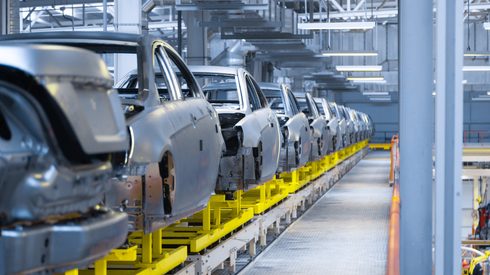Fastmarkets’ inaugural monthly price assessment for boric acid, technical grade, granular, cif China, was $900-1,050 per tonne on July 31, while the price for boric acid, technical grade, cif Brazil – also the first monthly assessment – was $950-1,050 per tonne on the same day.
From January to July 2024, imports into Brazil of hot-dipped galvanized steel with the addition of other steel alloys, such as boron, increased by more than 400% compared with the corresponding periods in 2023 and 2022, according to Comex Stat, a trade database from Brazil’s Industry, Development and Trade Ministry (MDIC).
Fastmarkets’ own data analysis considered the Mercosur Common Nomenclatures (NCM) code cited by traders as the reference for boron-added material. For hot-dipped galvanized coil, the code was 7225.9200, which defines rolled products made of other steel alloys, with a width equal to or greater than 600mm, galvanized by another process.
Since the middle of 2023, Brazilian steelmakers have been asking the government for more stringent trade defense measures to curb imports, which has already caused some traders to change their trade routes and to test alternative products to avoid future tax burdens.
But the main obstacle in the path of Brazilian steel importers up to now has been the quota-tariff mechanism, which was announced in May this year and came into force on June 1.
The quota-tariff measure established import volume limits on products classified under 11 steel NCM codes over four-month periods, and a higher duty should these volumes be exceeded – up from the current 9-12% import tariffs on such products to 25%.
Boron, even in very small amounts, can increase the ability of carbon steels to be hardened. Furthermore, because it contains this material, steel purchased from overseas suppliers is given a different description in the NCM code list compared with material with no boron and, therefore, is subject to different trade defense rules.
“We started importing a lot of products with boron added, to get out of [paying] the quota,” a Brazilian trader said.
Material with boron is subject to a fixed tariff of only 12.6%
According to an importer source, material with boron included costs an additional $5-7 per tonne. But under Brazil’s quota-tariff system, it would be subject to a fixed tariff of only 12.6%, while more traditional, boron-free materials run the risk of attracting a 25% tariff on top of the value of the product, in the case of quota exhaustion.
Fastmarkets’ weekly price assessment for steel hot-dipped galvanized coil, import, cfr main ports South America, was $700-720 per tonne on August 16, steady week on week.
Although the import volumes for other products with boron added, such as Galvalume and hot-rolled coil, did not exceed the totals recorded in previous years, Comex Stat data reflected the volume of products that were purchased a few months earlier and have already entered the country via customs control.
So it is possible that even more significant volumes will be reported in the coming months, as a result of products being purchased after the quota policy came into force.
For Fastmarkets’ HRC analysis, NCM code 7225.3000 was considered, which describes a hot-rolled product with other steel alloys, with a width equal to or greater than 600mm. For Galvalume, the NCM code 7225.9990 was used, which characterizes flat-rolled products made from other steel alloys, with a width equal to or greater than 600mm.
Besides being a way to avoid the worst effects of the quota system, the addition of boron is seen as an option to avoid further anti-dumping tariffs that might be adopted in Brazil.
“A lot of people are quoting [prices for] material with boron now. [If] any plant produces material like that… importers will try their luck [to avoid being taxed],” a second trader said.
On August 19, the Brazilian government opened an anti-dumping investigation into imports of Chinese flat-rolled steel coil and plate products. In light of that, some importers started to consider purchases of boron-added cold-rolled steel as well.
“So far, I haven’t received inquiries for this type of [boron-added] product, but I believe it may start,” a third trader source said.
Although the addition of boron is still an alternative to avoid the trade defense measures in the country, the Brazilian government is monitoring “NCM escapes” with the support of the national steel association Aço Brasil. The term, according to the association, refers to products imported specifically to avoid quotas.
“Among the approved NCMs there is what we call ‘makeup’, where the importer adds a bit of another product to the imported cargo, or changes the product’s dimensions by millimeters, just to alter the classification and [avoid] the system,” Marco Polo de Mello Lopes, Aço Brazil’s president, said during a press conference in late-June. He even cited boron use as an example of this.
And in a press conference in early August for the 2024 Brazilian Steel Conference, Sergio Leite, chairman of Aço Brasil’s board of directors, said: “We are active on all fronts and closely monitor the entire sector.”





